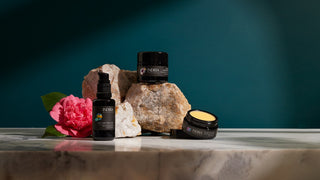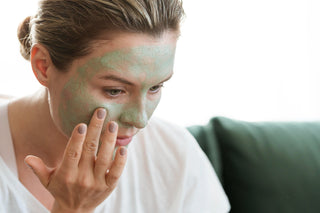In the ever-evolving world of skincare, face masks have emerged as a powerful ally in our quest for radiant, healthy skin. These concentrated treatments offer a moment of luxurious self-care while delivering potent ingredients deep into our skin.
At Indira, we believe in harnessing the power of nature to nourish and transform your complexion. Whether you're battling dryness, seeking a youthful glow, or simply needing a moment of calm, the right face mask can be a game-changer in your skincare routine.
What Does a Face Mask Do?
Unlike your daily cleanser or moisturiser, a face mask is designed to deliver concentrated ingredients deep into your skin's surface, working intensively during the 10-20 minutes it stays on your face. Think of it as a mini facial treatment you can enjoy at home.
What makes face masks particularly special is their ability to target specific skin concerns while providing that coveted spa-like experience. Whether you're dealing with tired skin that needs revitalising, congested pores crying out for a deep clean, or dehydrated skin thirsting for moisture, there's a mask formulated to help.
The Science Behind Face Masks
Face masks work through occlusion, creating a physical barrier over your skin that slightly increases the temperature and enhances the penetration of active ingredients. This process helps stimulate blood flow and collagen production, allowing beneficial ingredients to penetrate deeper into the skin's surface than through regular application.
The extended contact time between your skin and the mask's ingredients is crucial. Unlike cleansers that are quickly washed away or day creams that can evaporate or be rubbed off, masks create an environment where active ingredients can truly get to work. This prolonged exposure time, combined with the occlusive effect, helps explain why you often see such visible results immediately after masking.
The Top Face Mask Benefits
Let's dive into why incorporating a face mask into your skincare routine can be a game-changer for your complexion.
First things first, there are various types of facial masks available, the most popular being clay masks and hydrating masks.
When you apply a mask, particularly those with charcoal ingredients, it gently draws out impurities and excess oil that can accumulate in your pores throughout the day.
For those battling with dehydrated skin, a hydrating mask can deliver an intensive boost of moisture, helping to plump up tired skin and restore its natural bounce. This is particularly beneficial during changing seasons or after long flights when your skin needs extra hydration.
Addressing Your Skin Concern
One of the most remarkable benefits of face masks is their ability to target specific skin concerns. Whether you're looking to even skin tone, reduce the appearance of fine lines, buff away dead skin cells or combat excess oil production, there's a mask formulated with beneficial ingredients to address these issues.
For instance, masks containing vitamin C can help brighten uneven skin tone, while those with hyaluronic acid deeply hydrate and plump the skin.
How to Choose the Right Face Mask for Your Skin Type
Selecting the perfect face mask isn't just about picking the prettiest package or following the latest trend. It's about understanding your skin type and specific skin concerns to choose a mask that will truly benefit your complexion and fit your skincare routine.
Take our Skin Quiz to find out your exact skin type and the right mask for you.
Masks for Congested Skin
For those with oily skin, look for masks that help balance excess sebum without stripping your skin completely. Clay-based masks are particularly effective here, as they naturally draw out excess oil while helping to refine the appearance of pores and remove dead skin cells.
However, be careful not to overuse them, as this could trigger your skin to produce even more oil in response.
Masks for Combination Skin
For those with combination skin, the key is balance. You might find that different areas of your face have different needs—perhaps an oily T-zone but dry cheeks. This is where multi-masking comes into play, allowing you to simultaneously treat different skin care concerns with different masks. For example you could use a clay mask on your t-zone and a hydrating mask on your cheeks.
Masks for Dehydrated or Dry skin
If you have dry or dehydrated skin, cream-based facial masks are your best friend. These rich, nourishing formulas help deeply hydrate and strengthen your skin's moisture barrier. Look for ingredients like hyaluronic acid and natural oils in cream masks that will help restore your skin's natural glow without feeling heavy or greasy.
After oil cleansing, lather your skin with a cream face mask, and then finish with a soothing facial oil, to lock in moisture.
Masks for Sensitive Skin
Sensitive skin requires extra care when it comes to masking. Opt for gentle formulas with soothing ingredients like macadamia oil. Always patch-test new products first, and avoid masks with potential irritants like artificial fragrances or harsh exfoliants.
The Indira Difference
At Indira, we believe in the transformative power of botanical ingredients combined with scientific innovation. Our facial mask collection embodies this philosophy, offering two distinct formulations that work harmoniously to address different skin concerns.
The Power of Two: Our Signature Masks
Refine Clay Mask
Unlike conventional clay masks that can leave skin feeling stripped and tight, our Refine Mask gently draws out impurities while simultaneously exfoliating and soothing your skin. The secret lies in our carefully curated blend of ingredients:
-
Nutrient-rich clays combined with Activated Bamboo charcoal to detoxify and decongest pores
-
Australian Desert Lime, packed with antioxidants and vitamin C, brightens and calms the complexion
-
Papaya enzymes provide gentle exfoliation for velvety, smooth skin
Our Refine Mask is also activated when you add water, so you can go through the ritual of whipping up your mask and then applying it gently to the skin - just like in a spa.
Replenish Mask
A gorgeously goopy mask, our Replenish mask delivers intense hydration and healing benefits. This mask is a testament to the power of remedial botanicals:
-
Arnica works to heal and soothe irritated skin
-
Cucumber Hydrosol provides immediate calming and hydrating effects
-
Macadamia Oil softens the epidermis for improved texture
-
Native Blue Butterfly Pea and Marine macroalgae work in synergy to intensely hydrate and even out skin tone
-
A heavenly blend of Blue Tansy, Grapefruit, and Mimosa creates an aromatherapeutic experience
These masks work beautifully together as part of a comprehensive skincare routine. For those practising multi-masking, use the Refine Clay Mask on areas needing clarification (typically the T-zone) while applying the Replenish Mask on areas requiring hydration (usually the cheeks and outer areas of the face).
How to Properly Apply a Face Mask
The art of applying facial masks goes beyond simply slathering product on your face. To maximise your masking session's benefits, let's walk through the perfect application process that will elevate your skincare routine to new heights.
Start with double cleansing your skin – this ensures your mask can work its magic without having to fight through layers of makeup, SPF or daily grime. It's worth taking a moment to gently massage your cleanser into your skin, paying special attention to areas that tend to get congested.
Before applying your mask, consider using a warm towel to open your pores. This simple step helps your skin become more receptive to the beneficial ingredients in your mask. When you're ready to apply, use clean fingers or a facial mask brush to gently massage the product onto your skin in upward, circular motions. Be mindful to avoid the delicate eye area, and take your time to ensure even coverage across your entire face.
A clay mask is ready to remove when it’s half dry and half ‘wet’ - this way, it won’t draw excess sebum and create a skin imbalance.
Incorporating a Facial Mask into Your Skincare Routine
The key to seeing visible results from face masks lies in consistency and timing. While it might be tempting to use a mask daily, most skin types benefit from masking 1-2 times per week. This gives your skin enough time to respond to the treatment without becoming overwhelmed.
Evening is often the ideal time for masking, as your skin naturally enters repair mode while you sleep. After removing your mask, your skin is particularly receptive to other skincare products, making it the perfect time to apply your serums and moisturisers. Think of your face mask as laying the groundwork for the rest of your skincare routine to work even more effectively.
For those dealing with specific skin concerns, you might want to adjust your masking schedule seasonally. For instance, dehydrated skin might benefit from more frequent hydrating masks during winter months, while oily skin types might need more balancing masks during humid summers.
Discover Your Best Skin Naturally
By incorporating the right face mask into your regimen, you're not just treating your skin—you're indulging in a moment of self-care that benefits your complexion and your well-being.
At Indira Organics, we believe in formulations that work synergistically with your skin to deliver exceptional results. Our range of organic skincare products harness powerful native botanicals and other active ingredients backed by science. Here's to effortlessly embracing your natural beauty.



